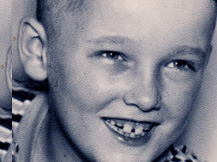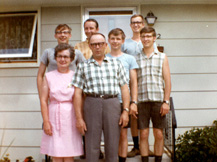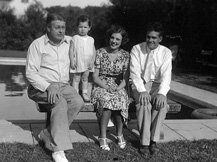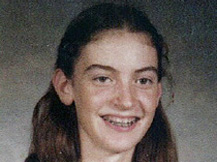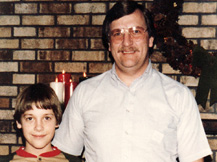
July 27, 2009
Home | Monsters of Economy | Say a Prayer | The storytellers | About this project | Tell us your story
What was your first recession like?
The United States has weathered many recessions in its history -- at least one every decade. What do you remember from your first recession and how did those experiences affect you and your family? Share your story here
-
1957-59: The fun seemed to have gone out of the family
Stephen Roe, Plymouth, Minn.
I was 13 and old enough to be aware that my dad was laid off from one of his two jobs and my mom took work as a part-time bookkeeper to help out.
We ran a tab at our neighborhood grocery store in Ithaca, NY. When I went to pick up the groceries my mom ordered me to choose what to re-shelve in order to stay under the credit limit the store owner imposed on his customers. That had never happened before. I also recall my father being unable to make the final lay-away payment on a bicycle for my younger brother's birthday. My brother never did get the bike.
My parents had no more "nights on the town," and my brother and I took up my money-making schemes -- pop-bottle collecting, caddying, paper routes. As a family the only indulgence we shared was my mother's great cooking. She could make the wild game my dad and I shot into first-class meals and we ate well.
When times improved my parents didn't return to their nights out and I moved on to more mainstream schoolboy work as a dishwasher in a local restaurant. Much of the fun seemed to have gone out of the family.
-
1969: Our family still harbors anger about the loss of our heritage and lifestyle
Brian Carlson, Grand Rapids, Minn.
In 1969, our family farm was condemned for expansion of Minnesota Power in Cohasset. We had no place to go and a short time to get there. All the issues of selling the animals, equipment, land, and trying to find a place to go were downright unbearable. We all had to find work off the farm then, too. Lots of anger, lack of funds, frustration in the job search, all made the transition most difficult.
There were six of us of working age when we left the farm. None of us were able to get jobs at Minnesota Power which would have been a great trade off and made us feel much better about having to leave. Our family at times still harbors anger about the takeover and the loss of our heritage and lifestyle.
We moved into town after never having lived in town before. We were challenged to seek careers with skills we had not needed on the farm and had to adjust to buying our food now instead of raising it ourselves and canning. The health issues that came with the stress of all this took a toll as well. There was much sickness those first two years until we adjusted.
I was 19 and went to work for the school district as a painter and substitute custodian to pay for my college education. Dad got a job a year later as a custodian at the school and finished his career there. It cost more to live in town than it did on the farm because we had to buy all our food, meat, berries and fish instead of getting them from the land first hand.
Several of us boys had planned to stay on the farm to raise our families. It was the best life: fresh air, growing things from scratch, great neighborhood, and our own lake along with a mile of Mississippi River frontage. What could be better? I wouldn't have had to go to college to get numerous degrees to keep up with all the changes in careers due to government cutbacks and other businesses' losses.
-
1930s: My mother fed hobos sandwiches on our back step, and worried
Corinne Livesay, White Bear Lake, Minn.
The Great Depression affected not only my family, but those of my family's friends. Most had all their money in bank stocks, thought to be safe. My father, who was making $100,000 a year at the time, lost everything, and we moved from an "estate" to a house in town.
A lot changed during those years, and he was never able to bring his business back to the way it was. Those were the first times when I heard the family say, "Well, we can't afford it." and even pennies for candy at the little store across from my grade school were very hard to come by.
When my father died, he left my mother some property, which she had difficulty selling. It was only because of her small Social Security check and a job at the local drug store that we survived and I was able to go through college.
In the 30's, when I was adopted, most people lost everything. Families couldn't feed their children, and sometimes gave them up for adoption. In my neighborhood growing up, there were two of those children, adopted by different families. My mother fed hobos sandwiches on our back step, and worried.
-
1980s: We moved to a town so small I could walk around it in one hour
Christina Neitz, Minneapolis
During the 1980s recession, my dad's job for the State of Nebraska was eliminated. As a result of losing his job we had to move from the only town I'd lived in. My parents looked locally, in nearby states and further away for jobs. We ended up moving from Norfolk, NE to Graceville, MN; from a town of 18,000 to a town of 500; from a ranch house to a trailer home; away from all of the friends we'd had for 16-plus years and from a close family.
We moved to a town so small I could walk around it in one hour and went from being a B student to a mostly A student due to the limited classes and smaller student body. It was hard on a 16-year-old moving to such a culturally different town.
If you weren't related to someone in town, chances were your crib was next to theirs at the hospital. Entertainment was beer bashes at abandoned farms and the gossip was about who totaled their pickup and who got knocked up ('80's teen baby boom).
It's taken my parents nearly 30 years to become accepted as 'real' residents of the town. If we had not left Norfolk, NE, I would've finished school in the system I'd attended since kindergarten with friends I'd had forever and gone to college in Omaha or Lincoln.
I probably would not have had to learn to be more outgoing. I think I might've been less cosmopolitan than I am now, less well-travelled, and more conservative.
-
1980-82: Impending doom
Jason Howard, Minneapolis
I was 11 or so years-old. My father was a small town, independent banker. I remember my father having to repossess cars of kids' parents I knew and how distraught my dad was over things like that happening in our small town.
The thing I remember most was a simple sense of "impending doom." As a little kid, I am not sure I knew what that meant, but I had a sense that something bad was happening in the world -- that life was not as easy as it should be or was before.
I remember that most every night around the dinner table it was stories about which business in town was in trouble, which of my friends' parents had been laid off from the GM plant and who was looking for work or moving away.
It seems I also remember a feeling that the kids my age did talk about it. A kid in our "GM bedroom town" could not escape knowing what GM was, or who worked there, who didn't. There was also a real pressure to hunker down, buy American, buy GM. It was in a way a sense of supporting our community spirit in defiance of the bad times.
-
1980s: Easier to find work
Anne Peiffer, Minneapolis
During the "rolling recession" of the '80s, I worked for an aerospace company that first saw the bottom drop out of its defense work. Then because fewer people were flying around the country doing contract work, the bottom fell out of its commercial work. After several rounds of layoffs, of which I was in the last, the company was sold to another aerospace company and all the employees, many of whom had been working there for years, had to re-apply for their jobs.
I found work first in a digital fingerprinting company then in an ISP startup. I think it was easier to find work in that recession because the internet was a new frontier for commercial business and generated enough jobs to take up the workers from other industries. Unless we can get the green revolution going and creating jobs, I don't think we will see that ever again.
-
1971: I desperately went looking for one of the rare summer jobs
Stephen Edlund, Forest Lake, Minn.
I was 20 years-old and between my freshman and sophomore years of college. Richard Nixon was president and the long 70's economic lethargy was just beginning.
The previous summer I had a job with the US Postal Service in the Midway area of St. Paul which paid an amazing $3.45 an hour. Because of government spending cutbacks in response to the 1970s stagflation (remember WIN buttons?) my postal service job was terminated for that next summer and I desperately went looking for one of the rare summer jobs available to college students at that time.
I spied an ad in the Minneapolis Tribune and applied for a minimum wage job (maybe $1.25/hour) with the RL Polk Company in which I was to go door-to-door gathering personal data about the occupants of households in the Minneapolis area. This data included things such as who lived in the house, their ages and their occupations. There might even have been questions about salary, too. These were questions that I would probably not answer today if some stranger came to my house and asked them of me, but times were different.
I was interviewed for the job and quickly assigned to an area that started on Plymouth Avenue on Minneapolis near the Northside and was told to work my way in a northerly direction. You must remember that this was not long after the riots that occurred here in 1967. Needless to say, I was being put into a situation which was a total 180-degree change from my nearly homogeneous upbringing in Thief River Falls. I was truly a duck out of water.
The RL Polk jobs were not available the next year, so my next two summers were spent working as a Maple Grove park activities supervisor and at various temporary jobs. While they were both good jobs and paid slightly higher wages, they did not present me with the same type of opportunities to see life from a different side.
This background became invaluable during my 34-year career as a science teacher in Coon Rapids, Minnesota, especially later in my career as the demographics of our school began to change as more minority families moved out to our attendance zone from Minneapolis and other areas. At least I could relate a little to the new situation.
Sponsors
In The Spotlight
-
The Current Music Blog
Your daily note for good music, news and pop culture. With attempted jokes.


